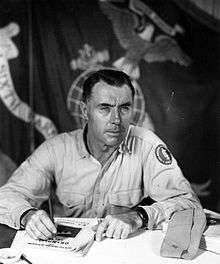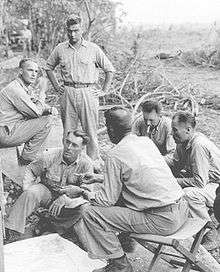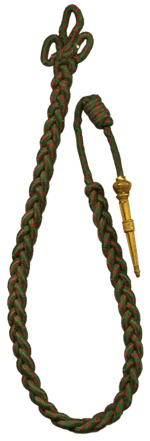William J. Whaling
| William John Whaling | |
|---|---|
 Whaling while served with 6th Marine Division | |
| Nickname(s) | "Wild Bill" |
| Born |
February 26, 1894 St. Cloud, Minnesota |
| Died |
November 20, 1989 (aged 95) Philadelphia, Pennsylvania |
| Place of Burial | Arlington National Cemetery |
| Allegiance |
|
| Service/branch |
|
| Years of service | 1917–1954 |
| Rank |
|
| Service number | 0-1049 |
| Commands held |
MCRD San Diego ADC of 1st Marine Division 1st Marine Regiment 29th Marine Regiment |
| Battles/wars | |
| Awards |
Navy Cross Silver Star Legion of Merit (2) Bronze Star Medal Purple Heart (2) |
William John Whaling (February 26, 1894 – November 1989) was a highly decorated Officer of the United States Marine Corps with the rank of Major General, who was expert in the Jungle warfare during the Pacific War. He also participated as a sport shooter in the 1924 Summer Olympics, where he finished in 12th place in the 25 m rapid fire pistol competition.[1]
Early years
Whaling was born in St. Cloud, Minnesota and enlisted in the Marine Corps in May 1917. He served as Non-commissioned officer during the Battle of Belleau Wood, where he was wounded by the efects of the combat gas. Whaling was later commissioned Second lieutenant in August 1918 and assigned to the staff of the 6th Marine Regiment. He distinguished himself during the Battle of Saint-Mihiel in September 1918 and was decorated with Silver Star for gallantry in action.[2]
World War II
At the time of Japanese Attack on Pearl Harbor, Whaling served within Marine Barracks there. He was transferred back to the 5th Marine Regiment, where took again command of the 2nd Battalion at the end of December 1941. Whaling was appointed Executive officer of the 5th Marine Regiment on March 28, 1942.[3] He was succeeded by Lieutenant Colonel Harold E. Rosecrans in the command of the 2nd Battalion.
During the Guadalcanal Campaign, Whaling was assigned as Operations and Plans Officer to the staff of the 1st Marine Division under the command of Major general Alexander Vandegrift in September 1942. General Vandergrift was an admirer of Lieutenant colonel Robert Rogers, who organized and trained raider units skilled in close combat and reconnaissance behind enemy lines during the French and Indian War.[4] Thus he tasked Whaling with the organization of scout-sniper detachment and training of specially selected groups trained in scouting stalking and ambush tactics. Whaling developed more his idea of reconnaissance units and created the basics for Marine Scout and sniper Company and for Marine Recon itself.[4]

While served at Guadalcanal, he was wounded by enemy fire and remained in hospital until February 1943. For his merits in developing of the recon units of the 1st Marine Division, Whaling was promoted to the rank of Colonel and decorated with Legion of Merit.[2] He also received the Navy Presidential Unit Citation. Whaling was subsequently transferred to take command of the 1st Marine Regiment, where he succeeded Colonel Clifton B. Cates. He later take part in the Battle of Cape Gloucester, where he distinguished himself again and was later decorated with second Legion of Merit with Combat "V".[2]
Whaling was relieved by Colonel Chesty Puller on 28 February 1944 and sent back to the United States. After his arrival, he was assigned to the Headquarters Marine Corps in Washington, D.C., until he was transferred to Camp Pendleton, California, where he took command of the 2nd Training Regiment. Whaling remained in San Diego until the spring of 1945, when he was sent overseas again.
It was 6th Marine Division, which fought at Okinawa with Major general Lemuel C. Shepherd Jr. in command and Whaling was ordered to relieve Commanding Officer of the 29th Marine Regiment, Colonel Victor Bleasdale, who struggled with the enemy. He took command of the 29th Marines on 15 April 1945 and participated in Battle for Sugar Loaf Hill, where he distinguished himself again. For his gallantry in action, Colonel Whaling was decorated with the Navy Cross.
Navy Cross citation
His official Navy Cross citation reads follows:
The President of the United States of America takes pleasure in presenting the Navy Cross to Colonel William J. Whaling (MCSN: 0-1049), United States Marine Corps, for extraordinary heroism as Commanding Officer of the Twenty-Ninth Marines, SIXTH Marine Division in action against the enemy Japanese forces on Okinawa, Ryukyu Islands, from 15 April to 21 June 1945. Assuming command of a regiment committed to extensive operations over an exceptionally broad zone of action on Motobu Peninsula, Colonel Whaling skillfully maneuvered elements of his command through rugged and precipitous mountain terrain to aid in driving the enemy to a final defensive position on Mount Yaetake. Though his forces were widely dispersed during this phase of the campaign, he unhesitatingly exposed himself to direct hostile fire among the most advanced elements of his Regiment, thereby obtaining maximum coordination which resulted in crushing the last enemy resistance. By his conspicuous bravery in personally directing assault units, Colonel Whaling contributed materially to the seizure of the desperately defended Sugar Loaf Hill. His aggressive and inspiring leadership during the subsequent landing on Oroku Peninsula was an important factor in the successful reduction of one of the most heavily fortified Japanese strongholds encountered. Colonel Whaling's gallant conduct throughout was in keeping with the highest traditions of the United States Naval Service.[2]
Later career
Whaling remained in command of the 29th Marine Regiment after the Surrender of Japan and participated in the occupation duties in Tsingtao, China during the outbreak of the Chinese Civil War. After the disbandment of the 6th Marine Division and its units in April 1946, he returned back to the United States. For his service in China, Whaling was decorated with Bronze Star Medal and with Chinese Order of the Cloud and Banner, 4th Class.[5]
His subsequent assignment was as Chief of Staff of the Marine Barracks at Camp Lejeune, North Carolina, where he served until end of June 1949. Whaling stayed at Camp Lejeune and was promoted to the rank of Brigadier General on 1 July 1949 and appointed Assistant Division Commander of the 2nd Marine Division under the command of Major general Thomas E. Watson.[5]
He was transferred to the 1st Marine Division in May 1951 and served in the same capacity as Deputy of Major general Gerald C. Thomas. Whaling went to Korea and participated in combats until June 1952, when he returned back to the United States. After his return back, he was temporary assigned Commanding General of the Marine Corps Recruit Depot San Diego in April 1952, succeeding Major general William T. Clement in this capacity.[5]
Whaling remained as Commanding General until September 1952, when he was relieved by Major general John T. Walker and appointed Deputy Commanding General of this Depot. He remained in this capacity until 1 July 1954, when he finally retired from the Marine Corps. Following his retirement, Whaling was advanced to the rank of Major General on the retired list for having been specially commended in combat.[5]
Major general William J. Whaling died on November 20, 1989 in Philadelphia, Pennsylvania. He is buried at Arlington National Cemetery, Virginia.[6]
Decorations
 | ||||
| 1st Row | Navy Cross | Silver Star | Legion of Merit with one 5⁄16" gold star and Combat "V" | |||||||||||||
|---|---|---|---|---|---|---|---|---|---|---|---|---|---|---|---|---|
| 2nd Row | Bronze Star Medal | Purple Heart with one 5⁄16" gold star | Navy Presidential Unit Citation with two stars | Marine Corps Expeditionary Medal | ||||||||||||
| 3rd Row | World War I Victory Medal with five battle clasps | Army of Occupation of Germany Medal | Second Nicaraguan Campaign Medal | Yangtze Service Medal | ||||||||||||
| 4th Row | American Defense Service Medal with Base Clasp | American Campaign Medal | Asiatic-Pacific Campaign Medal with five 3/16 inch service stars | World War II Victory Medal | ||||||||||||
| 5th Row | China Service Medal | National Defense Service Medal | Korean Service Medal with one 3/16 inch service star | Haitian National Order of Honour and Merit | ||||||||||||
| 6th Row | Haitian Médaille militaire with Diploma | Order of the Cloud and Banner, 4th Class (Republic of China) | Korean Presidential Unit Citation | United Nations Korea Medal | ||||||||||||
References
- ↑ "William Whaling". Sports Reference. Retrieved December 24, 2014.
- 1 2 3 4 "Valor awards for William J. Whaling". valor.militarytimes.com. Militarytimes Websites. Retrieved 14 November 2016.
- ↑ "USMC Monograph: The Guadalcanal Campaign". ibiblio.org. ibiblio Websites. Retrieved 14 November 2016.
- 1 2 "1st Recon Battalion Association" (PDF). 1streconbnassociation.org. 1st Recon Battalion Association Websites. Retrieved 14 November 2016.
- 1 2 3 4 "Library - University of Wisconsin" (PDF). images.library.wisc.edu. Image Library - University of Wisconsin. Retrieved 14 November 2016.
- ↑ "MG William J. Whaling - Find a Grave Memorial". findagrave.com. Find a Grave Websites. Retrieved 14 November 2016.